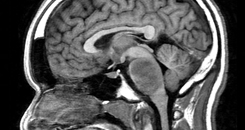 In December 2017, the pediatric neurosurgery and neuro-oncology teams at Duke’s Preston Robert Tisch Brain Tumor Center began enrollment for a phase 1b, single-site clinical trial assessing the safety of PVSRIPO—a genetically recombinant, nonpathogenic poliovirus/rhinovirus chimera developed by Duke neurosurgeon Matthias Gromeier, MD—in pediatric patients with WHO grade III and IV gliomas.
In December 2017, the pediatric neurosurgery and neuro-oncology teams at Duke’s Preston Robert Tisch Brain Tumor Center began enrollment for a phase 1b, single-site clinical trial assessing the safety of PVSRIPO—a genetically recombinant, nonpathogenic poliovirus/rhinovirus chimera developed by Duke neurosurgeon Matthias Gromeier, MD—in pediatric patients with WHO grade III and IV gliomas.
The study follows promising results from Duke’s phase 1 trial of PVSRIPO in adults with recurrent grade IV gliomas, which demonstrated the safety of the therapy and long-term survival in some patients. Based on the results of the adult trial, investigators are hopeful about the therapy’s potential in pediatric patients.
“We think a lot of the efficacy of this therapy lies in the immunogenicity it elicits—the inflammatory response of the patient’s immune system,” explains the study’s co-principal investigator (PI), Eric Thompson, MD, a pediatric neurosurgeon at Duke. “Because children generally have a more robust immune system than adults, we think it’s possible that this therapy will work as well if not better in children compared with adults.”
The trial will enroll 12 patients between the ages of 12 and 18 years and assess safety as a primary outcome measure and 24-month overall survival as a secondary outcome measure. Patients will receive a single dose of PVSRIPO and periodically return for follow-up to monitor tumor status, adverse events, and changes in blood immune profiles. Outcomes will be compared with age- and gender-matched historical controls.
Such studies are much needed in both adults and children with malignant glioma, Thompson says. “There are not currently many good options for these patients. They have received upfront therapy and often other types of therapy as well at recurrence, but typically they ultimately progress.”
“These tumors in children are not very responsive to conventional therapies such as radiation and chemotherapy,” says the study’s co-PI, David Ashley, MBBS, PhD, director of pediatric neuro-oncology and the Preston Robert Tisch Brain Tumor Center. “Innovative approaches are desperately needed. As we have seen in the adult patients, we are very hopeful that PVSRIPO therapy will make a substantial impact.”
For more information about the trial, call 919-684-2288.